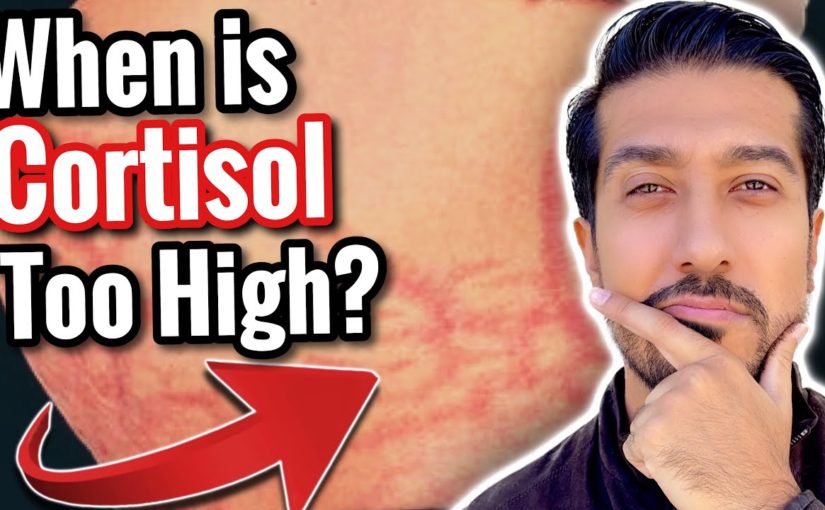00:00:30
First off, Everyone has high cortisol from time to time, and levels vary throughout the day. It’s part of your body’s natural response to threats of harm or danger. But, if your body consistently makes too much cortisol, thats when something could potentially be off. Because its The adrenal glands that make the hormone, but the hypothalamus-pituitary-adrenal axis that controls how much your body releases. ANd when it does get released, Most of the cells in your body have cortisol receptors, to take in the cortisol and do important tasks with it like: control blood sugar, reduce inflammation, regulate your metabolism, and can even help form memories. ANd really the only way to validate if your cortisol levels are in fact higher than normal, is to get them checked, either with blood, urine or saliva. And yes, its normal that it peaks in the early morning and declines throughout the day, reaching its lowest level around midnight. Sometimes if you work a night shift and sleep at different times of the day, this can change too, but the normal levels, lets say from 6 a.m. to 8 a.m. are about 10 to 20 micrograms per deciliter, and around 3 to 10 mcg/dL closer to 4 pm. But there are some clues we can use to help us determine if it is indeed high. Starting with the first being Weight gain, especially in your face and abdomen. This is known as the moon face. Where the face becomes more round, full or puffy. The sides of the face, you can see become so round from the buildup of fat that the ears can’t be seen from the front. Also you get the Fat depositing over the sides of the skull which adds to the face looking rounder. This is often but not always tied back to cushings syndrome, which comes with an array of its own symptoms, one hallmark is the Pink or purple stretch marks on the stomach, hips, thighs, breasts and underarms. The second symptom is: Excessive hair growth in females, otherwise known as hirsutism. Which affects about 10% of women in the US. Having chronically high cortisol is not the only cause of hirsutism, we know that conditions like PCOS, acromegaly, and sometimes pregnancy can cause this to occur as well. You may have even experienced it by trying minoxidil which does go away once you stop. The third symptom of high cortisol is whats called the buffalo hump. This may be more of a direct association with cushings syndrome though, where you get the fat production that often gets deposited in the neck, which is known as lipodystrophy. Hopefully if you have experienced this, you have already discussed with your endocrinologist a plan to treat it by that stage. A fourth symptom of high cortisol is: just having weak bones, which can lead to osteoporosis and sometimes fractures. This is because Elevated cortisol levels interfere with osteoblast formation and decreases bone building, which then reduces bone density. Basically, more bone tissue is broken down than is deposited.
00:03:32
And lastly, easy bruising. Now this isnt only indicative of high cortisol. Chemotherapy, blood thinners, and aging are also some examples where bruising easily can occur. But the way in which Cortisol causes it, is how it breaks down some of the dermal proteins and how it weakens the small blood vessels. In fact, sometimes the skin may become so weak it develops this shiny, paper-thin quality which allows it to be torn easily too. This is an issue because it increases the chances of skin infections. Which is something we dont want.
00:04:08
And remember, there can be more symptoms than just these 5, a few others can be elevated blood sugar, high blood pressure, and mood swings. Many conditions share these similar symptoms, which is why if you suspect any of these, its important to discuss them with your primary care doctor to find the right treatment plan that is tailored for you and get a proper diagnosis. In the meantime, a few tips you can take to help manage cortisol, be it that you have been diagnosed with cushings syndrome, adrenal gland tumor, on corticosteroids, or lets say none of those, and you feel like your cortisol is always elevated. Yes, speak to your doctor, but also Start by changing up some lifestyle measures that you can start implementing today like getting quality sleep, which is in fact treating conditions like sleep apnea or insomnia that affect this, exercising regularly, combating stressful thinking patterns, practicing deep breathing exercises, and a current favorite of mine known as shinrin yoku, which is forest bathing, since we have some evidence that people who practice forest bathing, “salivary cortisol levels were significantly lower in the forest groups compared with the urban groups.” and how “Overall, forest bathing can significantly influence cortisol levels on a short term in such a way” Also, if you are in the clear to try supplements by your doctor, adaptogens can be a great starting point. 2 of my favorites are Ashwagandha which we talked about a lot on this channel, studies show us that a “high-concentration full-spectrum Ashwagandha root extract safely and effectively improves an individual’s resistance towards stress and thereby improves self-assessed quality of life.” Secondly, rhodiola rosea: which extracts shows us an “anti-fatigue effect that increases mental performance, particularly the ability to concentrate, and decreases cortisol response to awakening stress in burnout patients with fatigue syndrome.” Both of which I link down below in the description that you can check out as well as videos discussing them in more detail for you down there as well.
00:06:15
Im more curious to hear from you guys though. what are your thoughts? Let me in the comments below. Also, hit that subscribe button too if you found value in this, and ill see you on the next one.



